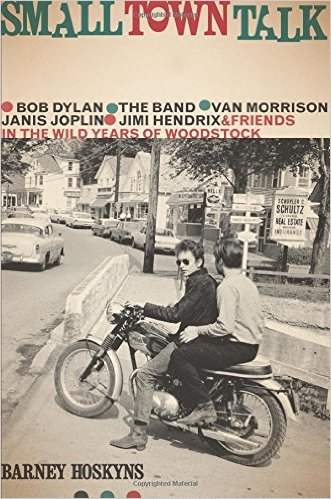
Yup, that’s Bob Dylan on his motorcycle right in the middle of the town’s main thoroughfare, Tinker Street
Small Town Talk
Barney Hoskyns
(Da Capo Press)
In a word: Illuminating
The game-changing 1969 Woodstock festival, most true rock fans know, didn’t actually take place in the arts-friendly upstate New York town of Woodstock, but rather some 60 miles southwest in the farmland community of Bethel. In Small Town Talk—with its wordy, explanatory subtitle of “Bob Dylan, The Band, Van Morrison, Janis Joplin, Jimi Hendrix, and Friends in the Wild Years of Woodstock”—British author Barney Hoskyns doesn’t concern himself all that much with the famous festival; it’s a necessary but ultimately minor player in a more encompassing, illuminating saga.
To Hoskyns—whose previous books include the equally exhaustive (and mega-titled) West Coast companion piece Hotel California: The True-Life Adventures of Crosby, Stills, Nash, Young, Mitchell, Taylor, Browne, Ronstadt, Geffen, the Eagles, and Their Many Friends—it’s the town that’s of interest. Situated about a hundred miles north of New York City and boasting a population that has yet to reach 10,000, Woodstock initially landed on the music map in the late ’60s thanks to Dylan and the musicians who would ultimately become The Band. Small Town Talk is the story of refugees like them fleeing the chaos and paranoia of the rat race, embracing the peace and nature of this welcoming oasis, making some of the best (and sometimes worst) music of their lives, but ultimately discovering that leaving their demons behind was just another pipe dream.
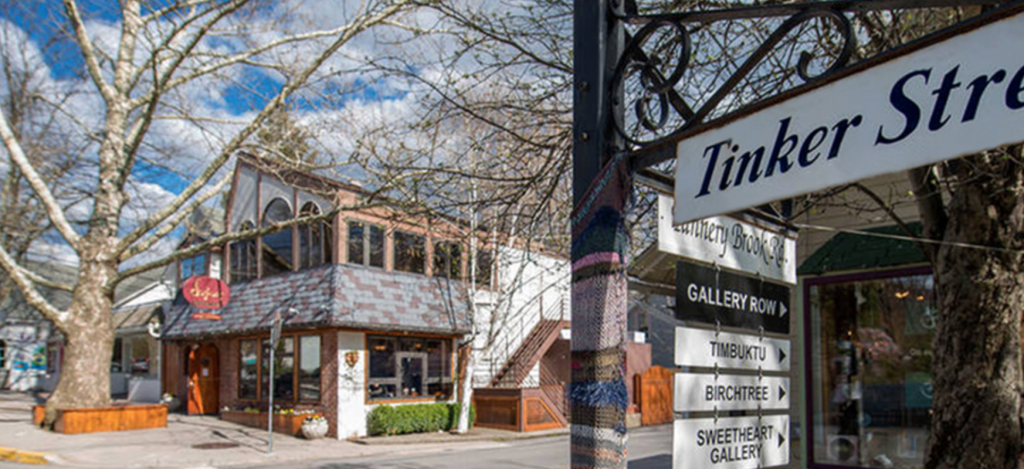
The same thoroughfare today from a slightly different angle (Photo: Woodstock Chamber of Commerce)
It all begins—and in many ways ends—with the mercurial Albert Grossman, who sets up shop in the still somewhat obscure Woodstock in the early ’60s, performing management duties from there for a host of A-listers—many of whom would also settle in the town—including Dylan, The Band, Peter, Paul & Mary, Joplin, fish-out-of-water Todd Rundgren (whose name, as a longtime Woodstock habitué, really should replace that of the almost-invisible Hendrix in that subtitle) and numerous others. Charismatic and enigmatic to a fault, Grossman is a confirmed eccentric, an undeniable genius and, by at least some accounts (notably Dylan’s), a money-grubbing, self-absorbed shyster of the first order.
Related: 50 years ago in Woodstock, Bob Dylan’s brush with death
But whatever else he might have been, it was Grossman who nearly singlehandedly created the myth of Woodstock, providing not only physical facilities—his Bearsville Recording Studio was legendary and he often housed musicians in need of a crash space—but a spiritual home for creative musical artists. From his arrival in Woodstock, Grossman saw the potential in the area, buying up and building on properties left and right, becoming mega-wealthy even as he retained an idiosyncratic streak rare even in the music business. Over time, the biz became of lesser importance to him, but Woodstock never did.
Hoskyns delves deeply not only into the questionable business dealings but the love-him-or-hate-him (or both) persona of the gray-ponytailed Grossman, and the labyrinthine relationships among the diverse musicians who came and went over the years: the perpetually grouchy Morrison, erratic bluesman Paul Butterfield, chanteuse Maria Muldaur, junkie folkies Tim Hardin and Karen Dalton, real-deal Southern singer-songwriter Bobby Charles and, as Woodstock evolves into a desired destination for musicians of all artistic persuasions, modern rockers such as Graham Parker, Marshall Crenshaw and the band Mercury Rev.
None, however, looms as largely throughout the story as Levon Helm, The Band’s beloved Arkansas-born drummer. If one musician personifies the spirit and lifestyle—for better and worse—of the Woodstock enclave, it was Helm, who remained in the town after the group’s 1976 breakup, eventually building, on his own property, a combination recording studio/concert space he dubbed The Barn. There Helm eventually hosted—at events collectively dubbed the “Midnight Ramble”—dozens of top-name performers from Kris Kristofferson to Allen Toussaint, Mavis Staples to Jackson Browne, and of course Helm himself, until he simply became too ill to play anymore. Despite his estrangement from The Band’s de facto leader Robbie Robertson, a sad subtext as the years progress, Levon Helm still represents, to many, what Woodstock has always really been about.

Graham Nash at a photo exhibit of his work in Woodstock, with Best Classic Bands’ Founder Greg Brodsky in August 2015
Many of the main characters in Small Town Talk are gone now: Grossman, Butterfield, Helm and fellow Band members Rick Danko and Richard Manuel. Most of the others have moved away—Dylan lives in Malibu, as un-Woodstock a place as can be. The town itself either thrives—still something of a mecca for free souls and the disenfranchised—or is a ghost of its once glorious self, depending on one’s feelings about tourists, their money, and the tchotchkes they seek in shops that once housed humbler mom-and-pop operations. As for the music scene, Hoskyns makes clear that it too is largely gone, save for Helm’s Barn and a few lesser spots. What happened in Woodstock over the course of a few decades was one of those right place/right time moments, changing everything and then taking its leave.


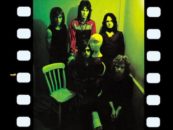
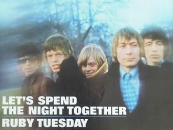
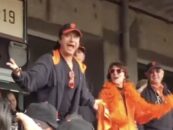


No Comments so far
Jump into a conversationNo Comments Yet!
You can be the one to start a conversation.